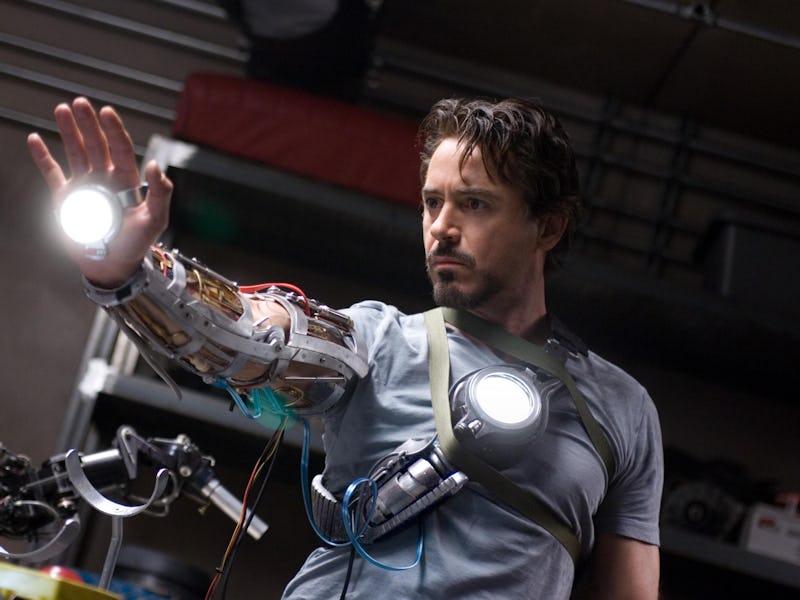Iron Man Was a Product of Its Time, In the Best and Worst Ways
15 years ago, Marvel’s biggest gamble paid off — but it learned all the wrong lessons from its success.

Fifteen years ago, the superpower we know as Marvel Studios was capital-B broke. Marvel had already pawned some of its most profitable, popular heroes — like Spider-Man, the X-Men, and the Fantastic Four — to other studios back in the ‘90s. In the ‘00s, Marvel was pawning its furniture. In a last-ditch gambit, the company took out further loans, staking its entire library as collateral to finance its first solo film. Marvel had one chance to get out of the hole, and it all rested on the shoulders of a C-list hero.
Few knew who Iron Man even was at the time, but Marvel still backed the future of its empire on Tony Stark alone. It was a ludicrous leap of faith, but it paid off with spectacular results. In the 2008 film, you can see flashes of the form that would come to define the Marvel Cinematic Universe. But for all its innovations, Iron Man was still a product of its time.
Marvel’s first (and last) gritty superhero movie
Grounded, gritty superhero films were already beginning to dominate their own corner of the industry. Batman — once synonymous with camp, cornball puns, and fetishwear costumes — did a complete heel turn in 2005’s Batman Begins. (The James Bond franchise got a similar overhaul with Casino Royale in 2006.) Iron Man represented Marvel’s attempts to cash in on the trend. Instead, the struggling studio wound up starting a trend of its own — one that would remold Hollywood in its own image.
When we first meet Tony Stark (Robert Downey Jr., in the role that would redefine his career), he’s cruising through the desert valleys of Afghanistan with a military escort. Stark Industries is the leading weapons manufacturer in the world with an exclusive contract with the U.S. military dating back to World War II. Tony’s father, Howard, famously contributed to the Manhattan Project. Tony has inherited his prickly legacy as the “Merchant of Death.” For the Starks, peace means equipping the “good” guys with advanced weaponry — but that all changes when a terrorist organization captures Tony using his own weapons.
Tony’s life nearly ends when he takes a load of shrapnel to the chest, but he’s saved by another captive, Yinsen (Shaun Toub). To prevent the shrapnel from reaching Tony’s heart, Yinsen embeds an electromagnet into his chest. Director Jon Favreau frames the situation with the gruesome gravity it deserves. It’s downright jarring to see Tony claw at the bandages covering his chest. (The MCU has never matched that level of body horror in the 15 years since, though it’s come close.) There obviously wasn’t a limit on violence then. Iron Man only had to make the outlandish origin story of its hero seem plausible in the real world.
Tony Stark and American imperialism
Robert Downey Jr. and Jon Favreau on the set of Iron Man.
Tony is essentially reborn in that cave, his eyes opened to the horrors of the American war machine. “I saw that I had become part of a system that is comfortable with zero accountability,” he admits upon returning to U.S. soil. That’s a heavy observation for a superhero film — unfortunately, Iron Man isn’t nearly as woke as it thinks.
Iron Man is the quintessential post-9/11 movie. This is the closest Marvel gets to America’s shady foreign policy in the ‘00s, especially where its main villain is concerned. Obadiah Stane (Jeff Bridges) has been with Stark Industries from the beginning. He’s holding fiercely to the “old” ways, but he understands that technology and innovation are the only ways to guarantee that the US remains a global superpower.
Stane is the personification of our worst practices: the exploitation and exceptionalism that made America rich once upon a time. But Iron Man paints the issue as individual, rather than systemic. It’s touching on the point without fully committing to it, an evasive tactic that Marvel’s most “political” films — Captain America: The Winter Soldier and Black Panther, especially — perfected in their own frustrating ways.
Romance in the MCU?
Tony (Robert Downey Jr.) and Pepper’s (Gwyneth Paltrow) chemistry was never as good as in the first Iron Man.
For all its flaws, Iron Man still stands out for its decidedly adult themes. Aside from its of-the-era suggestive content (a sex scene and even a strip tease), there’s also the matter of Tony’s smoldering chemistry with assistant Pepper Potts (Gwyneth Paltrow). Their banter invokes classic screwball comedy, and even now, their relationship is one of very few Marvel pairings built on a strong foundation. By the time they returned for Iron Man 2, however, Marvel’s infamous “house style” was well on its way to taking over. Their connection is never as strong, and the same could be said for many of the film’s best qualities.
Marvel might have borrowed from an established mold in creating Iron Man, but it wasted no time in forging its own path. It gave us our first glimpse into a larger universe and demonstrated the true potential of Marvel Studios.
Unfortunately, the studio took all the wrong lessons from its success. The MCU doubled down on some of Iron Man’s lesser qualities: smarmy humor, forgettable villain, and reactionary takes on global politics. Few installments have retained the charm of Marvel’s first outing. That’s not to say the MCU never topped Iron Man, but it still remains one of the strongest films for one reason: it’s the only Marvel movie that was allowed to truly chart its own path.